You’ll find top-tier bird foods in 2025 that’ll make your feathered companions chirp with delight! ZuPreem offers specialized nutrition for parakeets, budgies, and large parrots, while Birds LOVE provides an all-natural garden blend packed with fruits and vegetables. Wagners Wild Bird Food attracts diverse backyard species, ensuring your birds get balanced, tasty meals. Each brand delivers essential nutrients, vitamins, and minerals to support your bird’s health and happiness. Stick around to uncover the full nutritional scoop.
Key Takeaways
- Specialized bird foods like ZuPreem offer tailored nutrition for different bird species, ensuring balanced diets with essential vitamins and minerals.
- High-quality bird foods focus on natural ingredients, avoiding artificial additives and preservatives to support overall bird health and immune function.
- Premium bird foods are scientifically formulated to address specific nutritional needs, promoting cardiovascular health, feather strength, and digestive wellness.
- Top bird food brands provide diverse blends that mimic natural diets, incorporating seeds, fruits, vegetables, and grains to stimulate natural foraging behaviors.
- The best bird foods in 2025 are characterized by their nutritional completeness, quality sourcing, and ability to enhance birds’ energy, vitality, and long-term well-being.
ZuPreem Natural Bird Food for Parakeets & Budgies (2.25 lb Bag)
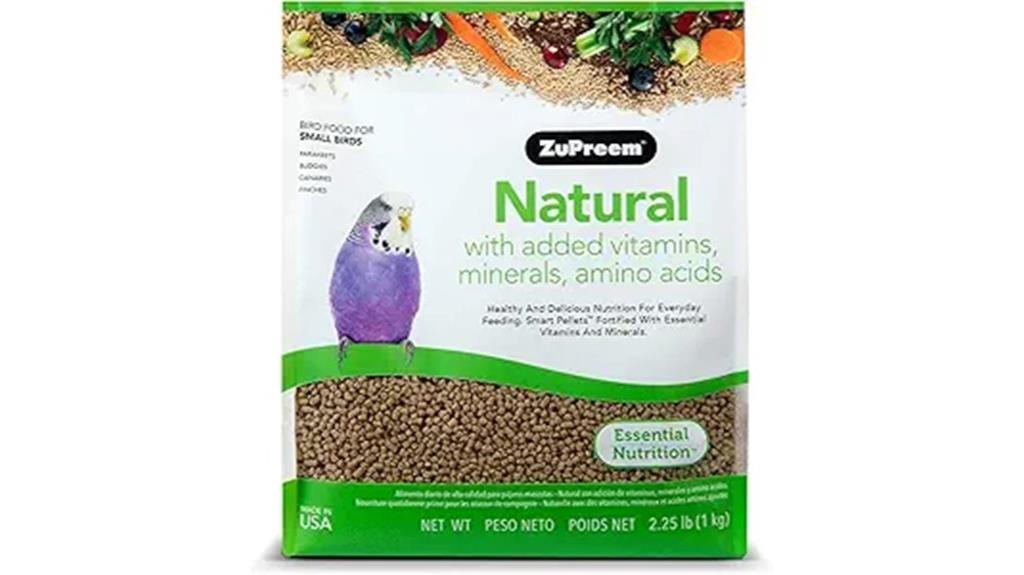
If you’re seeking a nutritionally complete diet for small birds like parakeets and budgies, ZuPreem Natural Bird Food stands out as a top choice in 2025. Made with whole grains and natural ingredients, this bird food delivers essential vitamins, minerals, and amino acids. Its uniform pellet shape guarantees consistent nutrition, while the firm texture promotes natural chewing and beak conditioning. You’ll appreciate that it’s free from artificial additives and supports digestive health, immune function, and feather strength, making it an ideal option for birds with dietary sensitivities.
Best For: Pet owners seeking a nutritionally complete, natural diet for small pet birds like parakeets, budgies, and parrotlets.
Pros:
- Contains whole grains and natural ingredients with essential nutrients
- Uniform pellet shape ensures consistent nutrition and prevents selective eating
- Free from artificial colors, flavors, and preservatives
Cons:
- May be more expensive than traditional seed-based diets
- Requires gradual transition for birds used to seed-only diets
- Limited to small bird species (not suitable for larger parrots)
https://www.amazon.com/dp/B001LK3E1U
ZuPreem Smart Selects Bird Food for Large Parrots (4 lb)
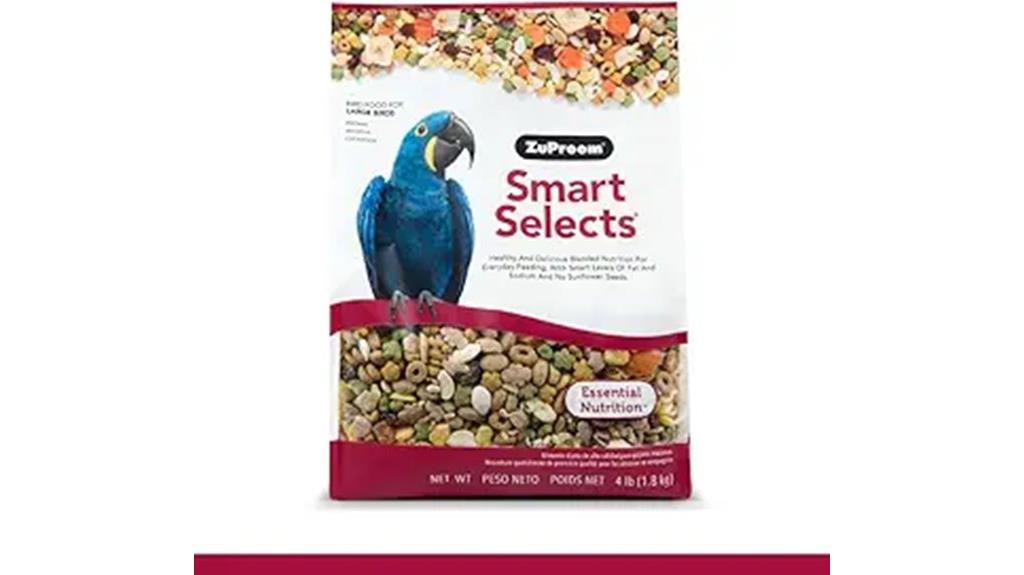
ZuPreem Smart Selects Bird Food emerges as a nutritional powerhouse for large parrot owners seeking an all-inclusive diet solution. Tailored specifically for Amazons, Macaws, and Cockatoos, this 4 lb blend delivers essential nutrients through a balanced mix of pellets, seeds, vegetables, and fruits. You’ll appreciate its thorough approach to supporting your bird’s cardiovascular system, liver, and feather health. With straightforward feeding instructions recommending 1/2 to 1 cup daily, this USA-made product offers a convenient, scientifically formulated diet that keeps your large parrots thriving and satisfied.
Best For: Large parrot owners with Amazons, Macaws, or Cockatoos who want a comprehensive, nutritionally balanced diet for their birds.
Pros:
- Scientifically formulated with a variety of ingredients including pellets, seeds, vegetables, and fruits
- Supports multiple aspects of bird health including cardiovascular system, liver, and feather condition
- Made in the USA with essential nutrients and vitamins
Cons:
- May be more expensive than traditional seed-only diets
- Requires careful portioning and monitoring of daily intake
- Some birds might need time to adjust to the new food blend
https://www.amazon.com/dp/B00KOWFYUU
ZuPreem Sensible Seed Bird Food for Cockatiels and Small Birds (2 lb)
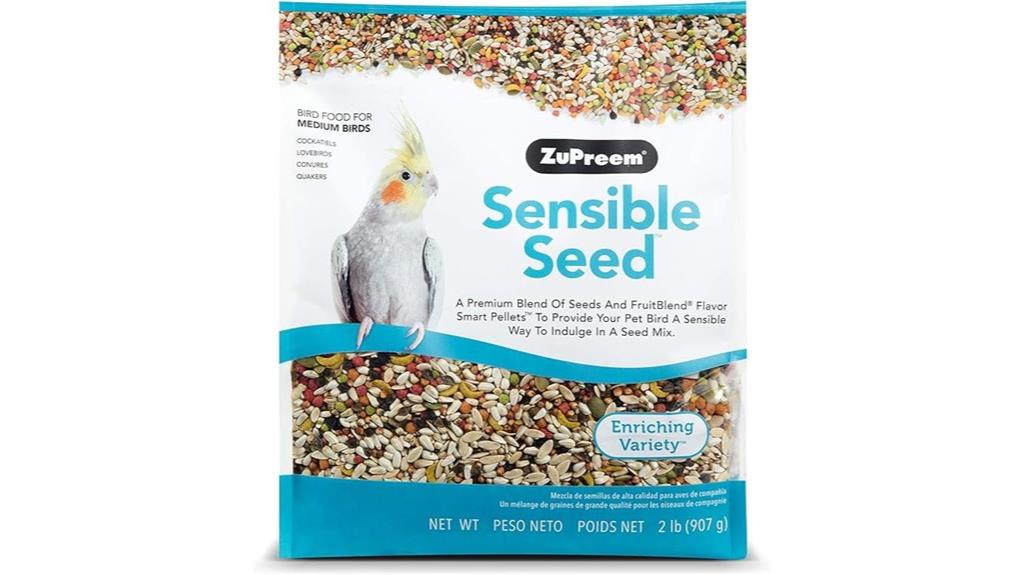
Cockatiel and small bird owners seeking a nutritionally balanced diet will find ZuPreem Sensible Seed Bird Food an excellent choice for their feathered companions. This premium blend combines high-quality seeds and pellets to stimulate natural foraging behaviors while preventing nutrient deficiencies. Fortified with essential vitamins, minerals, and amino acids, it supports immune health and feather strength. Ideal for Cockatiels, Lovebirds, Quakers, Small Conures, and Lorikeets, this seed mix can be fed up to 30% of your bird’s weekly diet, complementing ZuPreem’s pelleted nutrition program.
Best For: Bird owners looking to provide a nutritionally diverse and engaging diet for medium-sized birds like Cockatiels, Lovebirds, and Quakers.
Pros:
- Combines high-quality seeds and nutrient-rich pellets for balanced nutrition
- Stimulates natural foraging behaviors with varied shapes and textures
- Fortified with essential vitamins, minerals, and amino acids for overall bird health
Cons:
- Can only be fed up to 30% of the bird’s weekly diet
- Requires complementing with additional pelleted nutrition
- May not be suitable for larger bird species outside of the target audience
https://www.amazon.com/dp/B01GVVJJCG
Birds LOVE All Natural Garden Blend Bird Food for Parrots 2lb
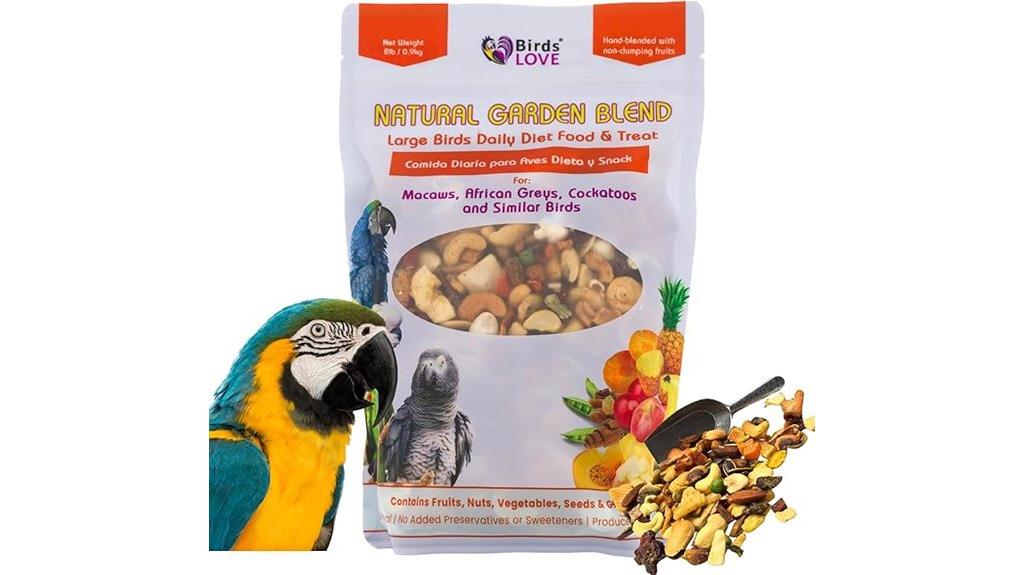
Parrot owners seeking a nutritionally rich and natural diet will find Birds LOVE All Natural Garden Blend Bird Food an exceptional choice, as this 2-pound mix delivers a colorful, wholesome blend of real fruits, nuts, vegetables, and seeds. Packed with beneficial vitamins, minerals, and carbohydrates, the nitrogen-flushed blend guarantees peak freshness. With no artificial additives and a 4.5-star rating from over 1,500 customers, you’ll appreciate the hand-blended quality that makes your feathered friend chirp with delight. Simply fill their feeding bowl and watch them enjoy this USA-made, nutritious feast.
Best For: Parrot owners looking for a high-quality, all-natural, nutrient-rich bird food that supports their pet’s health and enjoyment.
Pros:
- Contains real fruits, nuts, vegetables, and seeds for a balanced diet
- No artificial coloring, preservatives, or sweeteners
- Hand-blended and nitrogen-flushed for maximum freshness
Cons:
- May be more expensive than standard bird food blends
- Specific nutritional needs may vary between different parrot species
- Limited package size of 2 pounds might require frequent repurchasing for multiple birds
https://www.amazon.com/dp/B07HRZ93WX
Wagners Wild Bird Food with Cherry Flavor (10-Pound Bag)
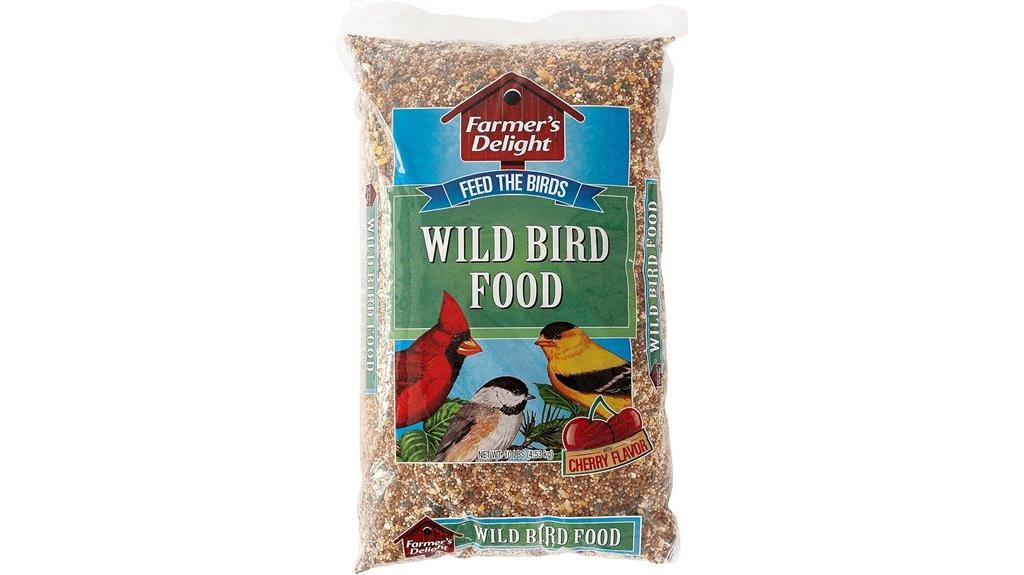
Bird enthusiasts seeking a versatile and wallet-friendly seed mix will find Wagners Wild Bird Food with Cherry Flavor an exceptional choice for attracting diverse backyard wildlife. This 10-pound blend contains high-quality grains, including sunflower seeds, that’ll draw numerous bird species to your feeders. With its distinctive cherry flavor and Made in the USA quality, you’ll enjoy watching small birds and ground feeders flock to your yard. While some birds might go through the seed quickly, the mix’s affordable price point and impressive 4.5-star rating make it a top recommendation for bird lovers looking to create a vibrant backyard ecosystem.
Best For: Bird enthusiasts looking for an affordable, high-quality wild bird seed mix that attracts a wide variety of backyard birds.
Pros:
- Attracts multiple bird species with its diverse seed blend
- Made in the USA with high-quality grains
- Affordable pricing for a 10-pound bag
Cons:
- Birds may consume the seed quickly
- Strong cherry odor might be off-putting to some
- Millet content may not appeal to all bird populations
https://www.amazon.com/dp/B00LHE5OSQ
Factors to Consider When Selecting Bird Food
When choosing bird food, you’ll want to ponder the specific species you’re feeding, as different birds have unique dietary preferences. Assess the nutritional content carefully, ensuring the food meets the health requirements of your feathered friends, and pay close attention to ingredient quality. The size, texture, and overall dietary needs of your birds will ultimately guide your selection, helping you provide the most appropriate and nourishing meal possible.
Bird Species Specific
Every avian enthusiast knows that selecting the right food isn’t a one-size-fits-all endeavor. Your bird’s species dictates its nutritional requirements, so you’ll want to tailor your choice carefully. Parakeets and budgies thrive on diets rich in whole grains, while larger parrots like macaws need nutrient-dense blends of pellets, seeds, and fresh produce. Cockatiels benefit from high-quality seeds and vitamin-fortified pellets that stimulate their natural foraging behaviors. If you’re caring for ground-feeding birds such as sparrows, opt for millet-heavy mixes. Nectar-feeding species like hummingbirds demand specialized sugar water or nectar formulas. By understanding and meeting your feathered friend’s specific dietary needs, you’ll support their overall health, promote vibrant feather condition, and prevent potential nutritional deficiencies.
Nutritional Content Matters
Just as a car requires the right fuel to run efficiently, your feathered companion needs precisely balanced nutrition to thrive. Pellet-based diets offer thorough nutrition that seed-only meals can’t match, ensuring your bird receives essential proteins, fats, carbohydrates, vitamins, and minerals.
When selecting bird food, check the nutritional breakdown carefully. Each species has unique dietary requirements that change with age and life stage. High-quality foods will transparently list their complete nutritional profile, helping you make informed choices. Avoid generic formulas that don’t address your bird’s specific needs.
Proper nutrition isn’t just about filling a food bowl—it’s about supporting your bird’s immune system, maintaining vibrant feathers, and promoting overall health. Choose wisely, and you’ll see the difference in your bird’s energy and robustness.
Ingredient Quality Counts
Because not all bird foods are created equal, the ingredients you choose can dramatically impact your feathered friend’s health and happiness. You’ll want to prioritize whole grains and natural ingredients while steering clear of artificial additives that offer no nutritional benefit.
Look for foods fortified with essential vitamins, minerals, and amino acids that support comprehensive avian wellness. Avoid products packed with empty fillers like excessive millet, which can lead to nutritional gaps and selective eating habits. Instead, seek out bird foods featuring diverse textures and shapes that stimulate natural foraging behaviors and prevent dietary monotony.
Your bird’s specific dietary needs—including protein, fat, and fiber requirements—should guide your selection, ensuring ideal nutrition tailored to their unique metabolic demands.
Dietary Health Needs
Understanding the intricate nutritional landscape of bird diets builds directly on recognizing ingredient quality. You’ll want to choose foods that match your bird’s specific species requirements, as each feathered friend has unique dietary needs based on size, metabolism, and natural foraging behaviors.
A balanced diet isn’t just about filling their bowl—it’s about providing essential vitamins, minerals, and amino acids that support overall health. Seed-only diets won’t cut it; you’ll need to incorporate high-quality pellets, varied grains, fruits, and vegetables. When shifting to a new diet, do it gradually to help your bird adapt.
Size and Texture
Every bird owner knows that selecting the right food involves more than simply grabbing a bag off the shelf—size and texture play critical roles in nutrition and feeding satisfaction. Your bird’s beak strength and species determine the ideal food characteristics. Larger birds like macaws need bigger, harder pellets that challenge their powerful beaks, while smaller birds such as parakeets require softer, more delicate options they can easily manipulate.
Uniform pellet shapes aren’t just aesthetically pleasing; they guarantee consistent nutrition and promote natural chewing behaviors. Firm textures help strengthen your bird’s beak, maintaining optimal oral health. By matching food size and texture to your bird’s specific needs, you’ll support their dietary requirements and keep them chirping happily.
Natural Ingredient Benefits
Just as beak-appropriate size and texture matter in bird nutrition, the quality of ingredients plays an equally significant role in your feathered friend’s health. Natural bird foods crafted with whole grains, fruits, and vegetables provide essential nutrients that support overall wellbeing, enhancing energy levels and promoting ideal digestion.
By choosing foods free from artificial additives and preservatives, you’ll help prevent nutrient deficiencies and selective eating behaviors. These nutrient-dense ingredients can boost your bird’s immune function, improve feather condition, and stimulate natural foraging instincts. Look for options that mirror a bird’s species-appropriate dietary needs, avoiding processed ingredients that compromise nutritional value.
Your commitment to natural, high-quality nutrition will keep your bird chirping with vigor and joy.
Budget-Friendly Options
While pet owners often worry about the cost of high-quality bird nutrition, smart shopping strategies can help you provide excellent nutrition without breaking the bank. Look for bulk seed mixes that cost under $1 per pound and consider switching to pelleted diets that offer thorough/extensive/all-encompassing nutritional value. Store-brand products can be just as nutritious as name-brand options at lower prices, and purchasing larger 10-20 pound bags typically reduces the cost per pound.
You can further stretch your bird food budget by supplementing commercial diets with affordable ingredients like cooked rice, oats, and chopped fruits and vegetables. These additions not only provide variety but also help manage feeding expenses without compromising your bird’s health. Strategic purchasing and creative feeding approaches make quality nutrition accessible for budget-conscious bird owners.
Feeding Frequency Rules
When it comes to bird nutrition, nailing down the right feeding frequency can make or break your feathered friend’s health. Your bird’s size determines its daily food intake, with small birds like parakeets needing 1-3 tablespoons and larger birds like macaws requiring 1/2 to 1 cup daily. Always provide fresh food and water, discarding uneaten portions before each feeding to guarantee spoilage does not occur.
Transitioning to a new diet requires patience. Gradually mix new and old foods over a week, allowing your bird to adjust. A varied diet including pellets, seeds, fruits, and vegetables confirms balanced nutrition. Remember, consistency is key—maintain regular feeding times and quantities to support your bird’s metabolism and overall well-being.
Frequently Asked Questions
How Often Should I Change My Bird’s Diet?
You’ll want to introduce dietary changes gradually and strategically. Typically, you should reassess your bird’s diet every 6-12 months, considering factors like age, health, and activity level. Don’t make sudden switches; instead, slowly incorporate new foods over 1-2 weeks. Watch for signs of acceptance or rejection, and consult an avian veterinarian to guarantee you’re meeting your feathered friend’s nutritional needs as they evolve.
Can I Mix Different Types of Bird Food Together?
“Variety is the spice of life,” and that applies to your bird’s diet too! You can definitely mix different types of bird food, but do it carefully. Combine seeds, pellets, and fresh foods to guarantee balanced nutrition. Just be sure to introduce new items gradually, watching how your feathered friend responds. Don’t overwhelm them with too many changes at once, and always consult an avian veterinarian for personalized advice.
What Signs Indicate My Bird Isn’t Getting Proper Nutrition?
You’ll notice malnutrition through several key signs: feather dullness, weight loss, decreased energy, and changes in droppings. Your bird might seem lethargic, have fluffed feathers, or display unusual behavioral shifts. Watch for weakened immune responses, like frequent illness, or skin and beak abnormalities. These symptoms suggest you’ll need to reassess your bird’s diet and consult an avian veterinarian to guarantee balanced nutrition.
Are Organic Bird Foods Really Better Than Standard Options?
Organic bird foods aren’t necessarily superior to standard options. You’ll want to focus on nutritional content rather than just the organic label. While organic foods may reduce pesticide exposure, they don’t automatically guarantee better nutrition. Look for balanced diets with proper protein, vitamins, and minerals. Compare ingredient lists and consult an avian veterinarian to verify you’re providing the most appropriate diet for your specific bird species.
How Long Can Bird Food Be Stored Safely?
Like a ticking time bomb of freshness, bird food has a limited shelf life. You’ll want to store dry seeds in a cool, dry place and use them within 6-12 months. Opened packages should be consumed faster—around 2-3 months—to prevent spoilage. Check for signs of moisture, mold, or odd smells. If you’re unsure, it’s better to toss it and buy fresh to keep your feathered friends healthy and happy.
Conclusion
Your birds aren’t just eating; they’re setting out on a nutritional journey that transforms their health and happiness. From ZuPreem’s precise blends to Wagner’s wild offerings, each seed and pellet represents more than mere sustenance—it’s a celebration of avian robustness. Choose wisely, and you’ll witness your feathered companions chirping with unprecedented vigor, their wings reflecting the vibrant nutrition you’ve carefully selected.

Maria is brilliant when it comes to creating beautiful and functional spaces. Maria has an exceptional ability to understand your needs and desires, translating them into tailored solutions that reflect your personality and lifestyle. Whether you’re seeking advice on home decor, looking to upgrade your interior, or seeking inspiration to enhance your quality of life through design, Maria can help you achieve your goals. With Maria by your side, your vision for the perfect home is within reach.
